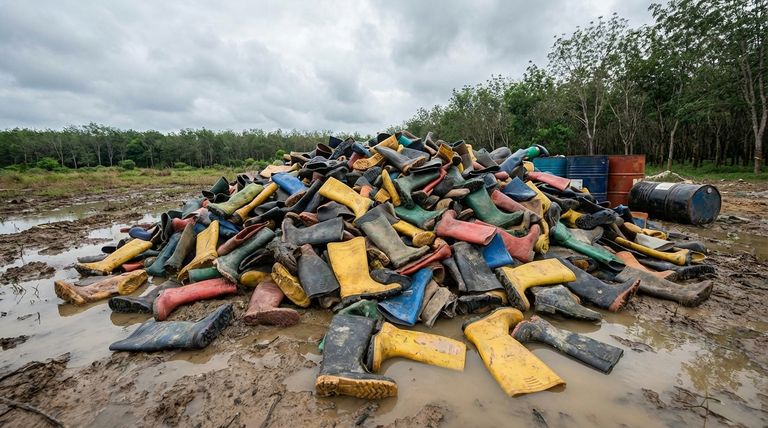Wellington boots have become a significant sustainability concern primarily because the vast majority are no longer made from natural rubber, but from Polyvinyl Chloride (PVC). This synthetic plastic is derived directly from crude oil, a finite fossil fuel. Crucially, these PVC boots are non-biodegradable and are not typically accepted in UK household recycling schemes, meaning their journey almost always ends in a landfill.
The core issue is the modern welly's linear "take-make-dispose" lifecycle. Most are crafted from oil-derived PVC, a material designed for low-cost production but not for reuse or natural decomposition, turning a practical symbol of country life into a lasting environmental burden.

The Material Shift: From Natural Rubber to Plastic
The story of the welly's environmental impact is a story of material change. What was once a durable, natural product has largely been replaced by a low-cost, disposable plastic alternative.
The Original Welly
Historically, Wellington boots were made from natural rubber, a sap harvested from rubber trees. This material is durable, repairable, and, under the right conditions, can eventually biodegrade.
The Rise of PVC
In recent decades, production shifted to Polyvinyl Chloride (PVC). This oil-based plastic is significantly cheaper and easier to mass-produce, making wellies widely accessible and affordable for everything from gardening to music festivals.
The Hidden Cost of Convenience
The convenience of PVC comes at a high environmental price. Its production relies on the extraction and processing of crude oil, a major contributor to carbon emissions and a non-renewable resource.
The End-of-Life Problem: A Boot's Final Footprint
The real environmental damage of a PVC welly becomes clear when it is no longer wearable. Unlike a pair of leather boots that can be repaired or an old cotton t-shirt that will decompose, a plastic welly has very few places to go.
A Journey to Landfill
Because they are made from a complex and often low-grade plastic composite, PVC wellies are not accepted in standard UK kerbside recycling programs. Their final destination is almost always landfill or incineration.
Indefinite Persistence
"Non-biodegradable" means that once in a landfill, a PVC welly will not break down for hundreds, if not thousands, of years. Every cheap boot bought for a single weekend event becomes a piece of permanent plastic pollution.
Understanding the Trade-offs
It's crucial to understand why this shift happened and the challenges involved. The move to plastic was driven by consumer demand for lower prices, but this has created a culture of disposability.
Cost vs. Longevity
The low price point of PVC wellies encourages consumers to see them as temporary items rather than long-term investments. This mindset fuels a cycle of over-production and waste.
The Challenge of Alternatives
While boots made from natural rubber are a more sustainable alternative, they come with a higher price tag. Furthermore, sourcing natural rubber must be done responsibly from certified forests to avoid contributing to deforestation.
Making a More Sustainable Choice
Your decision should be guided by your specific needs and commitment to reducing waste. The goal is to move away from the single-use mentality and embrace longevity.
- If your primary focus is longevity and reducing waste: Invest in a high-quality pair of boots made from natural rubber from a reputable brand and learn basic repair techniques.
- If your primary focus is cost-effectiveness: Buy the best quality boots you can afford, care for them properly to maximize their lifespan, and ensure they are donated or repurposed, not binned, when you are done with them.
- If your primary focus is avoiding new plastic: Seek out the small but growing number of brands that use recycled materials or offer a dedicated take-back scheme for their products.
By understanding the lifecycle of your boots, you can make a choice that better protects the landscapes you enjoy walking through.
Summary Table:
| Material | Source | Biodegradable? | UK Recyclable? | Typical Lifespan |
|---|---|---|---|---|
| PVC (Common) | Crude Oil | No | No | Short (Disposable) |
| Natural Rubber | Rubber Trees | Yes (under conditions) | Challenging | Long (Durable & Repairable) |
Looking for a sustainable footwear solution for your business?
As a large-scale manufacturer, 3515 produces a comprehensive range of durable footwear for distributors, brand owners, and bulk clients. We can help you move away from disposable PVC by offering high-quality, long-lasting boots designed for longevity and a reduced environmental footprint.
Let's create better products together. Contact our team today to discuss your manufacturing needs.
Visual Guide

Related Products
- Factory-Direct Wholesale Canvas Boots with High-Traction Rubber Soles
- Wholesale Safety Footwear Manufacturer for Bulk & Custom OEM Orders
- High Performance Fire-Retardant Waterproof Safety Boots
- Wholesale Waterproof Tactical Boots Custom Suede & High-Traction Soles
- Premium Wholesale Wheat Nubuck Safety Boot with Rapid Lacing System
People Also Ask
- How is quality control maintained in gumboot production? Ensure Durability & Safety
- What are the advantages of rubber boots for gardening? Unbeatable Waterproofing & Durability
- What role does the sole play in Wellington boots? It's the Engineered Foundation for Safety & Comfort
- What features should be considered when choosing wellies for toddlers and babies? A Guide to Safety & Comfort
- What design features of wellington boots help reduce fatigue for workers who stand for long periods?
- What are the Euro and UK size conversions for adult wellington boots? A Guide to a Perfect Fit
- What is the recommended method for drying half-boots after cleaning? Preserve Your Boots for Years to Come
- How should you clean the inside of rubber boots? Eliminate Odors & Extend Boot Life



















